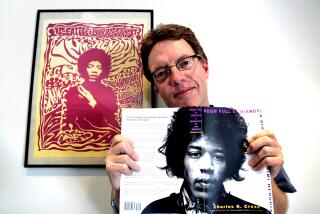Alan Douglas, associated with Jimi Hendrix’s later success, dies at 82
- Share via
Alan Douglas, a record producer who worked with a panoply of rock and jazz legends but is most closely associated with the phenomenal posthumous success of Jimi Hendrix, has died at his home in Paris. He was 82.
Douglas, who had been ill in recent months, died June 7 after complications from a fall, his daughter Kirby Veevers said.
Douglas recorded luminaries such as Duke Ellington, Charles Mingus, Eric Dolphy and Muddy Waters, sometimes blending talents from disparate styles of music. Heading United Artists’ jazz division in his mid-20s before establishing his own company, Douglas branched out into exuberantly radical books, promoting works by Timothy Leary and Lenny Bruce.
Douglas also is seen by many as laying the groundwork for hip hop with his early 1970s recordings of the Harlem-based group the Last Poets.
The producer got to know Hendrix in the late 1960s. They lived near each other in New York’s Greenwich Village and Hendrix bought stylish leather jackets at a shop owned by Stella Benabou, Douglas’ second wife.
In interviews, Douglas said he hung around with Hendrix backstage at Woodstock during the musician’s long wait to perform what became his signature piece: a piercing, haunting rendition of “The Star Spangled Banner.”
Four years after the 27-year-old Hendrix died of a drug overdose in 1970, Douglas acquired the rights to produce music that the guitar player had never released. Drawing on more than 1,000 hours of tapes, he cultivated new audiences for Hendrix, who rose to a level of popularity he never knew during his abbreviated lifetime.
In 1992, record stores were selling an estimated 3 million Hendrix albums a year — “mostly to people who were not yet born when he was alive,” according to the Independent, a British newspaper.
However, die-hard Hendrix fans blasted Douglas for tampering with greatness, occasionally bringing in his own studio musicians and over-dubbing Hendrix’s original sidemen.
“When the rhythm tracks aren’t working, you replace them. That’s what Jimi would have done,” the producer insisted, explaining the technique he used on an album called “Crash Landing.” “I did what I had to do and it sold 2 million copies.”
When an interviewer for Bam, a San Francisco music magazine, said critics likened the practice to remixing the Bible, Douglas was unpersuaded.
“Well, look what Christianity did to the Old Testament, man,” he said. “And now they’re BOTH accepted.”
After a complex legal dispute, Hendrix’s father took control of his son’s music in 1995.
Born Alan Douglas Rubenstein in Boston on July 20, 1931, Douglas grew up in Chelsea, Mass., and attended Colby College in Waterville, Maine, on a football scholarship. He and his brother Jerry worked at the family mattress business before plunging into entertainment. Jerry Douglas became an actor as Alan worked his way into the New York jazz scene.
“He had an amazing ear,” his daughter Kirby said, “and he was a very avant-garde guy. He could see trends before they became trends.”
When she was in fourth grade, her father sent Kirby two of his records to represent his occupation in a class career day. One started with Lenny Bruce barking out obscenities and the other was a racially charged rant from the Last Poets.
“I got sent directly to the principal’s office,” she recalled with a laugh.
In 2012, Douglas and two coauthors pieced together Hendrix’s diaries and notes for an account of his life called “Starting From Zero.” A documentary is in the works.
Douglas’ first three marriages ended in divorce.
In addition to his daughter Kirby and brother Jerry, Douglas’ survivors include his wife, Lucia Solazzi Douglas Rubenstein; daughter Solo Douglas; three grandsons; and sister Beverly Shuman.
Twitter: @schawkinshttps://twitter.com/schawkins
More to Read
Start your day right
Sign up for Essential California for the L.A. Times biggest news, features and recommendations in your inbox six days a week.
You may occasionally receive promotional content from the Los Angeles Times.







